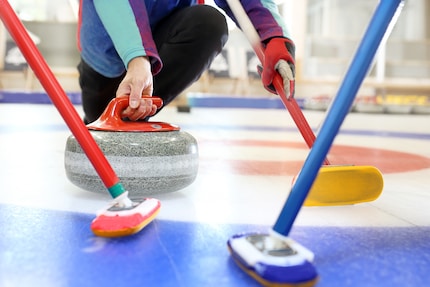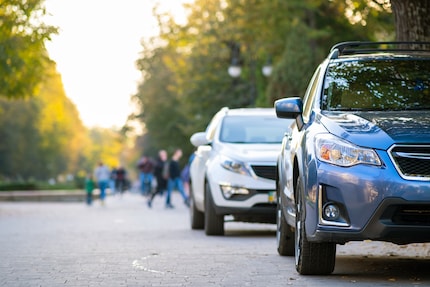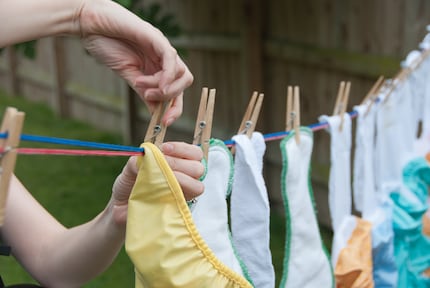
Background information
Colour, consistency, odour: let’s talk about children’s poop
by Katja Fischer

Forget helicopter parents. Lawnmower, aeroplane and dolphin mums and dads are here. No idea what I’m talking about? I was the same. With this run-down, you’ll be in the know from now on.
I came across the term «lawnmower parents» in an online post. My eyes stopped abruptly at the term. Lawn-mower-parents?! What on earth does that mean?

A brief search both enlightened me and raised more questions. Because I unexpectedly came across a lot of other bizarre parent labels. I was at least familiar with the concept of helicopter parents, and I could roughly imagine what taxi parents are. When it came to curling parents, dolphin parents and submarine parents, however, my powers of abstraction failed. So, I’ve fought my way through the jungle of parenting types to put together this incomplete and not deadly serious guide.
Probably the most well-known type of parent. Mother and father circle over their child like a helicopter and never let them out of their sight. There’s an overpowering fear that something could happen to their child or that they might not survive in a tough society. Israeli psychologist Haim G. Ginott used the helicopter metaphor for overprotective parents as early as 1969. American family therapist Wendy Mogel finally brought the term to prominence around the world in 2001. Other, similar parent types have since been derived from this.
They’re the same category as helicopter parents, but they go one step further. Curling parents not only constantly watch over their child, they also actively intervene in their lives. Similar to curling players, they pave the way for them through the icy road of life and remove possible obstacles. They’re also often equated with lawn mower or snow plow parents (see below).

In the helicopter parent family and essentially the same as curling parents. Lawnmower parents remove potential hazards before their kids can trip over them. The term comes from a teacher who described the phenomenon as follows in a 2018 article on Weareteachers.com: «Lawnmower parents go to whatever lengths necessary to prevent their child from having to face adversity, struggle, or failure. Instead of preparing children for challenges, they mow obstacles down so kids won’t experience them in the first place.»
Often equated with lawnmower or curling parents, but they can be even more aggressive when it comes to clearing their child’s path to success. Anyone and anything that stands in their way is cleared away like a snowplough.
A type of overprotective helicopter parent. Because they don’t want their children to have to walk to school, they arrive in the family taxi in front of the school building right at the start and end of the day. But not without blocking all the parking spaces, including the pavement. Instead of teaching their children to get to school, parents prefer to drive them in the hope of avoiding an accident. Or just avoiding bad weather.

Seen as a counter-movement to the helicopter parents of the baby boomer generation. While boomer parents focused heavily on their children while neglecting their own interests by hovering over their children like helicopters, millennials are taking a collaborative approach to parenting. They’re looking for shared experiences from which all family members – children and parents – can benefit. They follow the motto: everyone should be able to fly in a passenger plane.
The opposite of ever-present helicopter parents. Submarine parents dive below the surface and ignore unpleasant things affecting their children. They can’t be reached by teachers, they miss parents’ evenings and they’re conspicuous by their absence at theatre performances. But woe betide if the child is threatened with consequences. Then, according to «Focus» (in German), they appear in no time at all and with heavy artillery.
A phenomenon that has rarely been mentioned so far and only appears in connection with helicopter parents in a few discussion forums. Zeppelin parents are calm, slowly hovering and always far away – in complete contrast to helicopter fathers and mothers. Because of the gas, there is a permanent risk of combustion. If something goes wrong in their eyes, they explode with anger.
A tow truck is on hand if assistance is needed. That’s how these mums and dads work: no matter what’s happened to the child, they rush over, clean up and pull them out of the mess. Or, as Australian psychotherapist Frank Zoumboulis writes in a parenting blog, tow truck parents offer «disproportionate assistance, rather than allowing their [child] space».
Discipline and drills are the watchwords of tiger parents. Their aim is to achieve high performance and success in their children with authoritarian methods. The term was first made famous in 2011 by Chinese-born American Amy Chua, also known as «the Tiger Mom». In her book «Battle Hymn of the Tiger Mother», Chua described how she raised her daughters to be exceptional musical talents. Sleep and food deprivation were part of everyday life and only superlatives were accepted. When her four-year-old daughter gave her a birthday card she had made herself, for example, she rejected it and said she should make a new – nicer – one.
Dolphin parents – both animal and human – treat their young ones with love and care. They don’t force their offspring to do anything, but offer protection and freedom. Although they’re seen as authority figures and set rules, they discuss them with their children and respond to their needs. The «dolphin principle» comes from Canadian child psychiatrist and author Shimi Kang and is her alternative to tiger parents.
So far, this term is used almost exclusively in connection with mothers. According to «Urban Dictionary», a crunchy mom is «a member of an increasingly growing group of moms who are neo-hippies». Buying mainstream products or doing mainstream things is a bad thing in their eyes. A typical crunchy mom is vegan or at least vegetarian, bakes her own bread, gives birth to her baby at home and prefers reading to TV and using cloth nappies instead of disposable ones.

Just like crunchy moms (see above) – this term is almost always limited to the mother. According to «Urban Dictionary», silky moms use advances in science, medicine and technology to support their parenting. They use painkillers during childbirth, prefer bottles to breastfeeding and are often in favour of vaccination. This makes them the opposite of crunchy moms.
This more realistic concept sits between the extremes of the crunchy mom and scrunchy mom, using both educational principles. A scrunchy mom can approve of bottle feeding, vaccinations and hospital births while using cloth diapers and cooking baby food herself.
This is a relatively new type of parent, popularised by social media. Sittervising parents sit at the edge of the playground and watch their children play instead of actively participating. The concept is promoted as a win-win: the children play independently while being supervised in a safe environment, while the parents enjoy a short break. Mother of three and blogger Susie Allison of «Busy Toddler» created the term in 2021 by merging «sitting» and «supervising». One morning she was sitting on her sofa enjoying a cup of coffee and watching her toddler play. «I joked with my husband that I was «sittervising» – sitting and supervising at the same time.»
So, now you know. And you’re also well equipped if you want to show off some useless knowledge in the near future or categorise your peers at parents' evening. Meanwhile, the sense – or lack of it – of the phenomena and educational methods is a different discussion.
Mom of Anna and Elsa, aperitif expert, group fitness fanatic, aspiring dancer and gossip lover. Often a multitasker and a person who wants it all, sometimes a chocolate chef and queen of the couch.
Interesting facts about products, behind-the-scenes looks at manufacturers and deep-dives on interesting people.
Show all